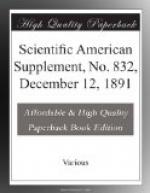OTHER COUNTRIES.
The beet sugar factory in Japan is said to be working with considerable success.
This year in Europe over 3,000,000 acres are devoted to beet cultivation. If the yield averages 12 tons, the crop of roots to be worked during campaign 1891-92 will certainly not be less than 36,000,000 tons, with a total yield of first grade sugar of about 7,300,000,000 lb.
Sugar sells for 9 cents per pound in Persia, where Russia has almost a monopoly of that business.
Finland imported, during 1889, 9,416 tons sugar, valued at $1,000,000. Germany supplied two-thirds of this at cheaper rates than Russia, owing to facilities of transportation. Two refineries are working; one of these uses exclusively cane sugar, while the other employs both cane and beet sugar.
A beet sugar factory in England, that has been idle for many years, is to resume operations under a new company, adopting the plan of growing a sufficient quantity of beets for an average campaign, independently of what all the farmers of the locality propose to do.
Siberia is to have a beet sugar factory. Experiments in beet cultivation have shown excellent beets may be raised there. Special advantages are offered by the Russian government, and factories are to be exempt from taxation daring a period of ten years. Sugar in Siberia is now considered an article of luxury, owing to distance and difficulties of transportation from manufacturing centers.
A special delegation from Canada has been sent to Europe, to study and subsequently report upon the true condition of the beet sugar industry.
A correspondent writes from Farnham, Canada, that the Canadian government grants a bounty of 2 cents per pound on beet sugar during campaign 1891-92. Duties on raw sugar were abolished last June.
* * * * *
AMERICAN WORKSHOPS.
An interesting paper on some of the leading American workshops was lately read before the members of the Manchester Association of Engineers on Saturday by Mr. Hans Renold. After expressing his opinion that the English people did not sufficiently look about them or try to understand what other nations were doing, Mr. Renold stated that he had visited that portion of America known as New England, and the works he had inspected were among the best in the United States. Among the many special features he had noticed he mentioned that in a Boston establishment where milling machine cutters were made he had found that L1 spent in wages produced as much as L30 to L40 worth of goods, the cutters being made at the rate of about sixty-four per hour by about a dozen men. Another noticeable feature was the exceptional care taken in storing tools in American workshops. These, in fact, were treated as if they were worth their weight in gold; they were stored in safes much




